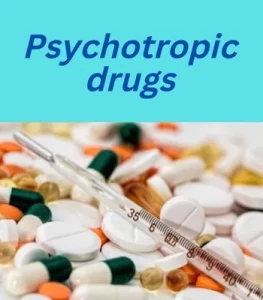psychotropic drugs
- Category most common psychotropic drugs question
 Some people are suspicious of psychiatric drugs, and some ask about their effectiveness, and whether they cause addiction.
Some people are suspicious of psychiatric drugs, and some ask about their effectiveness, and whether they cause addiction.
And if psychiatric medication is effective? is every psychiatric medication suitable for every case?
In this article, we will discuss the types of psychotropic drugs, their effectiveness in treating diseases, and their side effects.
Types of psychotropic drugs.
Psychiatric drugs have several types, each type is used to treat a specific disease, according to the diagnosis of the treating doctor. Here are the most important types of psychiatric drugs:
Type 1: anti-anxiety drugs.
Before we get to anti-anxiety medications, we’ll look at the concept of anxiety.
What is anxiety?
Worry does not mean fear – anxiety indicates Fear of facing a particular situation.
That situation does not involve a real danger that requires such fear.
While fear is a natural feeling and necessary for survival.
For example, if a person sees a snake or a predator, feels panic, runs, or runs away, it is not called anxiety, but rather a natural fear, and even necessary to stay alive.
What are anti-anxiety drugs?
Antianxiety medications are psychotherapies prescribed by psychiatrists, and may also be prescribed by family doctors.
Some antianxiety medications are used daily and some may be used when anxiety symptoms occur or when the cause of anxiety is encountered.
For example, a person with repeated panic episodes, or with OCD because anxiety is always accompanied, will use antidepressant medications regularly.
A person who is afraid of public places or is on an airplane is advised to take the medicine for accidental use only.
The duration of these medications varies from patient to patient, with some patients using them for long periods and others using them for short periods.
Types of anti-anxiety medications.
- Drugs (Selective serotonin reuptake inhibitors) SSRIS
- Drugs (Selective serotonin noradrenalin reuptake inhibitors) SNRIS
Both families increase the level of serotonin in the brain, a hormone called happiness hormone that also has several functions to help treat anxiety.
Antianxiety drugs are taken daily and these medicines begin to take effect after a few weeks.
These drugs are mainly used to treat depression and other conditions such as obsessive disorder.
- A group used to treat anxiety is benzodiazepines (benzodiazepines or BZD), which act as a sedative and are characterized as quick-acting.
However, due to the rapid and calm effects of this group, it leads to psychological addiction, which is the main defect of this drug, as stopping this medicine is accompanied by withdrawal symptoms.
Also, if used for a long period, it requires a dose increase to obtain the same effect, known as Tolerance.
- Beta-blockers such as the known Inderal drug may also be used.
- Anxiety can also be treated by a group of alpha inhibitors such as prazosin, which treats post-traumatic stress disorder.
- Buspirone is used in the treatment of generalized anxiety disorder (GAD).
Type 2: Anti-depressants.
Before we talk about antidepressant medications, we will quickly look at the concept of depression.
What is depression?
Depression is a well-known mood disorder that affects about 5% of the population of all ages, usually affecting women more than men.
There are different types of depression such as post-natal depression.
The patient takes antidepressant medications for at least 4-6 weeks to feel better (the patient usually feels better in most cases within two to three weeks).
A medication change is not made 5-6 weeks before regular use unless it causes serious side effects to consult a doctor immediately.
If the treatment is successful, the patient will continue to take the drug for at least 6 months, taking into account the treatment of other symptoms and comorbidities.
Types 2: Antidepressants drugs
There are several types of antidepressants:
Tricyclic antidepressants (TCA), and monoamine oxidase inhibitors (MAOIs)
Tricyclic antidepressants (TCA) were found in the 1950s, the TCA was effective at improving mood, and was found as a breakthrough in therapy in the 1950s and 1960s, along with the(MAOIs) group of inhibitors.
The result of severe side effects of the (MAOIs) group.
Their use is limited to patients with drug-resistant depression and those who have not successfully responded to advanced drugs.
Examples of Tricyclic antidepressants (TCA) include:
- (Amitriptyline).
- (Imipramine).
- (Nortriptyline).
Examples of the . group monoamine oxidase inhibitors MAOIs)).
- Tranylcypromine.
- Isocarboxazid.
- Phenelzine.
There is a group (NASSA) that has two groups (SSRIs and SNRIs (Serotonin and noradrenalin reuptake inhibitors).
This group has a specialized effect on dopamine and noradrenaline and is usually given along with other antidepressants.
What is the difference between SSRIs and SNRIs (serotonin and noradrenaline reuptake inhibitors)?
Serotonin is a hormone of happiness that helps improve mood.
- Low serotonin in the body can cause anxiety, depression, or suicidal thoughts.
- While the high serotonin improves sleep and relaxation, improving mood.
- The selective serotonin reuptake inhibitors and serotonin and noradrenaline reuptake inhibitors increase the level of serotonin in the brain and thus improve mood and treat symptoms of depression.
- Noradrenalin plays a major role in the response of the sympathetic nervous system during periods of stress, for example when a person feels threatened, the level of noradrenalin rises naturally.
- Noradrenaline also plays a role in improving sleep, attention, memory, and mood.
- When the level of noradrenalin decreases, it causes difficulty in concentration, and sometimes people with this hormone deficiency show symptoms of attention deficit and hyperactivity disorder (ADHD).
- When noradrenalin is elevated, it may cause ecstasy, but it may also cause panic, hypertension, and hyperactivity.
- Because of these effects, the combination of selective serotonin reuptake inhibitors and SNRIS may not be suitable for people with a history of panic disorders or some behavioral difficulties.
- Examples of SSRIs include:
- (Fluoxetine).
- (Escitalopram).
- (Paroxetine).
- (Citalopram).
- (Sertraline).
- Examples of (SNRIS) include:
- (Desvenlafaxine).
- (Duloxetine).
- (Venlafaxine).
Another group is called noradrenalin and serotonin reuptake inhibitors.
this group is used to treat generalized anxiety disorder (GAD), and attention deficit hyperactivity disorder (ADHD).
- It is also used to treat Parkinson’s disease and helps quit smoking.
- An example is one
- (Amineptine)
- (Bupropion).
- (Desoxypipradrol).
- (Dexmethylphenidate).
- (Difemetorex).
- (Diphenylprolinol).
- (Ethylphenidate).
- (Fencamfamine).
Type 3: Antipsychotic drugs
-
- These drugs treat some disorders, such as obsessive-compulsive disorder (OCD), and dementia.
- The group of antipsychotic drugs is divided into two types typical drugs and atypical drugs.
Examples of typical antipsychotic drugs:
- (Haloperidol).
- (Chlorpromazine).
Examples of atypical antipsychotic drugs are
- (Olanzapine).
- (Clozapine).
- (Asenapine).
Type 4: Stimulant drugs
This group works to increase the hormone dopamine
Examples include:
- Ritalin (Ritalin is used in the treatment of Attention Deficit Hyperactivity Disorders (ADHD).
- (Cocaine), and (Amphetamine).
Type 5: Mood-stabilizing drugs
-
- These medications work to treat some mental disorders such as bipolar disorder
- Examples of the first generation of this group:
- (Lithium).
- (Valproate).
- (Carbamazepine).
- Examples of the second generation of this group:
- (Risperidone).
- (Aripiprazole).
- (Quetiapine).
A side effect of psychotropic drugs.
Psychiatric medications, like any other medications, have many side effects. Each type of psychiatric medication has its own set of side effects.
But as long as the drug is used under medical supervision, there is no need to worry.
Side effects of anti-anxiety drugs.
- May cause an allergic reaction that leads to Swollen eyes, lips, and face.
- Difficulty in breathing.
- Panic attack.
- difficulty speaking.
- yellowish of the eye.
- may lead to suicidal thoughts.
- Skin Rash.
- Gastrointestinal disorders.
· Sleep disorders can lead to sleepiness, insomnia, and difficulty sleeping
· Vomiting and nausea.
· Sexual problems.
· Suicidal thoughts.
· Anxiety and fits of panic and panic.
· Extreme anger for the least reasons.
· Unjustified violence.
· Sudden discontinuation of antidepressants results in withdrawal symptoms such as:
· Muscle pain
· Anxiety, stress, and irritation
· Return of depressive symptoms
· Return of depressive symptoms
Side effects of antipsychotic drugs
• Sexual problems.
• Shaking in the hands
• Overweight.
• Muscle pain.
• Tension and insomnia.
• Difficulty in seeing
• Digestive disorders such as constipation
• Dry mouth.
Sudden discontinuation of antipsychotic medication results in withdrawal symptoms such as:
{ Sleep disorders.
{ Appetite disorders or…
Side effects of mood-stabilizing drugs
• Shaking in the hands.
• Dysfunction of pancreatic functions
• Vision disorders
• Hallucinations
• Increased risk of polycystic ovaries.
• May lead to an allergic reaction leading to swollen eyes, lips, and face.
• Heart rhythm disorder.
• An increase in the level of testosterone in women.
- Liver dysfunction.
When will the side effects of psychiatric drugs go away?
Medications to treat depression lead to vomiting, nausea, and other symptoms that go away within a few weeks of starting them.
When does the effectiveness of psychotropic drugs appear?
The effectiveness of psychotropic medication appears after two to three weeks at most, regularly.
Does psychotherapy cause sleep?
Yes, some psychiatric medications cause sleep, such as antidepressants.
Do psychiatric drugs affect memory?
Yes, some psychiatric medications affect memory, such as antidepressants and antipsychotics.
Do psychiatric drugs affect the heart?
Yes, some psychiatric drugs affect the heartbeat, such as mood-stabilizing drugs that increase the number of heartbeats.
But as long as the medications are taken under medical supervision, there is no need to worry.

